- Home
- Warwick Deeping
Two in a Train Page 2
Two in a Train Read online
Page 2
“It’s awfully good of you.”
He poured whisky into the metal cup of the flask.
“Drink it slowly. When it has warmed you up, try a little chocolate. I expect the idea is rather nauseating at the moment.”
She sipped the whisky, and her dark eyes avoided his.
He said—“You need not be afraid of me, child. I’m not like the fellow in there.”
She gave him a sudden quick glance.
“Oh, no. One feels that sort of thing.”
“Why don’t you take off your hat? I’ll hold it.”
Was it that he wanted to see her without a hat? She slipped off her black chapeau. Her hair was dark and wavy, and her forehead as gentle as her eyes. He took the hat.
“That’s it. Take the wind in your hair.”
Her colour was coming back.
“I don’t know why you should be so—kind.”
Marsland smiled. He was finding it more and more pleasant being kind.
“Made that way—I suppose. Nice people you are travelling with. I like the boy.”
She said—“He’s a dear.”
They could hear madame singing in the distance.
“Does she always do that in trains?”
For the first time the girl smiled.
“She’s a very famous person. Madame Bonheur—the operatic star.”
“Never heard of her,” said Marsland, “but that’s my ignorance, I suppose. After all—I know enough French to think there’s something significant in a name.”
“Bonheur?”
And then she coloured slightly, looked confused, and finished the whisky.
“I’m the—governess.”
“Yes—I presumed so. And I suppose you packed all that confounded luggage?”
“Yes.”
“Monsieur’s too?”
“Yes. And three trunks.”
“And in Paris you will unpack it all again?”
“Yes.”
He thought—“I’m damned if you shall.”
He produced the chocolate.
“Feel up to this?”
She nodded, and her eyes were different.
“Yes, just a little.”
“Splendid stuff plain chocolate. The first dinner is at half-past six.”
He took the empty cup from her and slipped the flask back into it.
“You are looking quite different.”
She gazed out of the window.
“I—feel—different.”
They were beginning to talk of more personal things when madame appeared in the corridor. Madame was angry; madame was always angry unless she was receiving applause in some form or other. Why was mademoiselle neglecting her duty? Pierre was feeling sick, and it was Miss Romney’s business to attend to Pierre.
Marsland, unseen by madame, had passed Avis her hat. She put it on and went back to the compartment. She saw that the window had been shut. Pierre was lying on the seat in Marsland’s corner, for madame had said that if there happened to be an accident the Englishman might just as well suffer the inconvenience.
Avis gathered up Pierre and sat down in her own corner with the child in her lap. Marsland had followed her, and she glanced from his face to the window. He nodded and drew it down.
Madame protested. Her precious throat and her comfort were the most important things in the carriage. Besides, the child would catch a dreadful cold.
But the child piped up—“I like the air, maman. It makes me feel good.”
Madame shrugged. Change seats with monsieur? No, she could not travel with her back to the engine. She would shiver; she would be a martyr. She covered herself with a rug, and went to sleep.
So did Pierre, and so did Miss Romney. Monsieur sulked in his corner behind a paper. Marsland, with the novel on his knees, sat and watched the girl’s face. He observed the long lashes, the gentle, poignant mouth, the delicate chin. The poor child was tired out. How delightful it had been looking after her. He would like to go on looking after her. She was sitting in seat No. 13, but perhaps No. 13 had a mysterious and happy meaning on this particular occasion.
Twilight came. The landscape was growing dim. The lights were turned on. A restaurant-car attendant appeared in the corridor with a little book of tickets. He opened the door. Places for dinner. Marsland asked for one. Monsieur asked for four, but madame was awake. Four? Most certainly not. Three. The girl could finish the sandwiches and cakes in the basket. Monsieur took three tickets. Avis and the child slept.
Presently a bell rang. Monsieur and madame got up with alacrity. Madame woke the child.
“Dinner—my son.”
She smiled icily at Avis.
“You may finish the cakes, Mees Romney.”
They went out.
Marsland looked at the girl. He was smiling, but he was angry. He said—“The pigs have gone to dine. Don’t they expect anybody else to require food?”
She looked whimsical.
“There is the tea basket.”
“I am going to empty their damned tea basket out of the window. Here, take this.”
He held out the ticket, and she blushed.
“Oh, but I couldn’t—really. You——”
“I can take my luck presently.”
She looked embarrassed.
“No—I’d rather not.”
He guessed that she had not enough money to pay for a dinner.
“I say—forgive me, is it a question of—cash?”
She nodded, and he took a sudden decision.
“Wait a moment. I’ll go along and see if there happens to be a spare place. Now—I forbid you to touch those cakes.”
She smiled up at him.
“But I haven’t any money.”
“Don’t you worry your head about that,” and he disappeared upon the adventure.
Marsland found that the restaurant car was not full, and he tipped the chief attendant and secured seats at one of the little tables for two in the second compartment. Monsieur, madame and Pierre were in the first, and deeply embedded in their soup. Marsland hurried back through three swaying coaches to find Miss Romney waiting in the corridor. He had a triumphant air.
“Quite all right. There is plenty of room.”
He was aware of something in her eyes. What was it? Humiliation? His compassion saluted her pride.
“Will you do me the honour of being my guest?”
She hesitated.
“I should like to—send you——”
He looked hurt.
“Oh, come. It’s such a little thing after all. We are going to get to know each other—at least, I hope so. My name’s Marsland—Geoffrey Marsland. I have come home to settle down in England—I mean, if I can find—— Let me give you dinner, my dear.”
She looked into his brown face, and smiled, and accepted both the “dear” and the dinner.
It was to be a miraculous meal. The French family were so absorbed in their food that they did not see Marsland and the girl pass their table. Marsland made her take the seat facing the engine.
“I say—I’m hungry.”
“So am I.”
“Feeling quite all right now? You look it.”
“Do I?”
His “Rather” made her blush. He was looking at the wine list and he ordered champagne.
“You’ll forgive me, won’t you?”
“What?”
“The champagne. It’s not a habit with me.”
She laughed.
“Ordering champagne—for—any casual—young person——”
With his elbows on the table he looked her straight in the eyes.
“If you think that—I’ll go back to the carriage.”
“Please don’t do that.”
“Then, you admit that you are not a casual young person from—my point of view?”
Again she blushed.
“I’m a girl who has to earn her living. You see—I——”
“Do you like earning your living? B
ut that’s rude of me. Most modern women are supposed to love it.”
She looked at the soup that had been placed in front of her.
“As a matter of fact—I loathe it.”
“I should say so—with people like that.”
They were half-way through dinner and becoming happy and easy with each other when Marsland met a pair of eyes. Madame had discovered them; she had recognized Miss Romney’s back, and she was announcing the discovery to her husband. Monsieur turned his flat head and stared. Madame looked outraged, and Marsland smiled at her distant indignation. Avis was unaware of the sensation they had caused, and he did not disillusion her. If there was going to be a row presently, he would be very much in it.
The scene was inevitable. Madame was waiting in the corridor, with Pierre and monsieur safely shut inside. She ignored Marsland and spoke insolently to the girl.
“A few words with you, mees.”
Marsland saw Avis turn and look at him, and he entered the compartment and shut the door. His participation came later.
Madame raged.
“Scandalous. Getting fresh with a strange man. A nice example for the child. You are dismissed. You need not come with us to the flat.”
Avis went white.
“I was hungry, madame, and——”
“Hungry! For sex—I suppose. You will leave us at the Gare de Lyon.”
“But, madame—I have hardly any money.”
“That’s not my affair, after this behaviour. Yes, go and see the English consul. I shall know what to say if he complains. Or perhaps this new monsieur will take you to an hotel—and pay.”
Miss Romney did not let that pass.
“I suppose that is your idea of—life, madame—but I am still young, and you—middle-aged——”
Madame’s indignation was operatic. She—middle-aged? Insolence. But those words had penetrated her powdered, perfumed and massaged skin. She flounced into the carriage, flopped down in her seat, and burst into tears, and when a Frenchwoman weeps the dead may be expected to rise.
“I have been insulted—disgracefully insulted.”
Monsieur looked alarmed. Pierre, staring at his mother, made one of those ruthless and innocent remarks that can come from the lips of a child.
“Don’t cry, maman; it makes your face look funny and old.”
Marsland went out into the corridor and closed the door. He said: “She’s got it in the neck. I suppose——”
Miss Romney gripped the rail.
“Yes—I’m dismissed. I’m to leave them at the Gare de Lyon.”
Marsland looked both concerned and fierce.
“Well—I’m——. And you——?”
She stared out of the window.
“Yes.”
“And it’s all my fault.”
But she would not allow that.
“Oh, no—you’ve been——”
He put one of his hands close to hers on the rail.
“You had better come straight back to England.”
“But—I haven’t a ticket, and——”
His hand touched hers.
“Look here, my dear—it’s up to me. I’m crossing by the night boat. Let me find you a ticket. No, please don’t think—— This train has been—what you might call destiny—from my point of view.”
She stood and looked out of the window at the night.
“I don’t know. I——”
“Have you anyone you can go to in England?”
“Yes.”
“Well—it’s really quite simple, Avis. I mean—it might be—if you—— What I mean is—when you have seen a bit more of me—you might be willing to let me ask you something. Would you?”
She seemed to smile mysteriously into the darkness.
“Yes—dear—I might.”
THE RAINBOW
He was blind.
He could be seen almost any day of the year sitting in a wooden arm-chair in the middle of a lunette-shaped excavation beside the London-Brighton road. On his left stood a red petrol pump, on his right a wooden table, and upon it a very large book, and one of those hand-bells that associate themselves with Victorian dinners. Around him spread a squalor of cinders. Opposite him, on the other side of the tarred road, a beech wood stood embattled in its beauty. Behind him a cheap new bungalow painted white, with a roof like a raw wound, squatted at the top of a clay bank. A shed thrust into a recess in this same yellow ramp bore over its double doors the mystic word “Garage.”
There were notice-boards:
“Pull In Here.” “Teas.” “Free Parking.”
The whole poor, shoddy improvisation was known as The Rainbow Garage and Tea Rooms, though what the rainbow had to do with it God knows, for the place had a hopelessness.
He was one of Mr. Lloyd George’s heroes, a brown and bearded man in a dastardly hat. He had the appearance of an apostle wearing—in chilly weather—an old army great-coat. Often he had that big book on his knees, the Bible in Braille, and some wag had called him The Blind Prophet.
The world on wheels flowed at his feet, and sometimes a lorry driver and his mate who knew the road would nudge each other and grin.
“Look at Holy Moses.”
“Yus, ’is ’at looks a bit greener than last year.”
But if John Tredgold’s eyes were sightless, his hearing had become extraordinarily acute. He knew when a car was slackening to pull in for petrol or oil, or for a shilling tea. His right hand would reach for the bell.
Clang—clang—clang.
“Mary—Bessie—garage.”
He had a voice with an edge to it. It was urgent, imperative, tyrannical. And if there happened to be delay he would go on ringing that bell until someone would appear at the top of the steps leading down from the bungalow.
“All right, father.”
It was as though he pulled a string and a little door opened, and obedient and flurried figures appeared. He was a man broken in the war, and his little world tried to humour him and to remember—that he was blind—and no tyrant.
It was not easy.
Up above on that tortured little plateau that was supposed to be a garden other activities displayed themselves, the rather unkempt products of two women who never managed to get Father Time by the forelock. There were weedy paths, and an attempt at floweriness, and six rickety tables and a dozen chairs, and a little drying-ground where the Rainbow’s linen saluted Sussex. Its stance was as precarious as its livelihood.
“O, damn that ruddy wind! It’s broken the clothes-line again.”
Mrs. Mary might have much sympathy for her daughter’s language, and clothes-lines—like most other things in the hero’s home—were cheap and rotten, but Mrs. Mary was afraid of her hero.
“Your father will hear you.”
“Let him. Do him good. Didn’t ruddy old Jehovah curse? Besides, we’ve got to wash those damned table-cloths again.”
Bessie was a darkly turbulent young thing aged nineteen, with an eye for a man and very modern ideas as to parenthood. She might be afraid of her father, and if she had remained under the edge of the Rainbow it was because of some queer primitive feeling for her mother.
“I don’t call this life. It’s cinders.”
Mrs. Mary said, “Don’t. Oh, do be quiet. Some things can’t be helped. I’ll do the table-cloths.”
“Oh, no, you won’t. You’re tired.”
Mrs. Mary was always tired, and her weariness was more of the soul than the body. She had been a pretty creature, cream and jet, with a face rather like a pansy, and a capacity for affection that was ready to fetch and carry. She was one of those women who, given one caress a day, will flutter about happily like a bird.
“I do hope it won’t be wet this week-end.”
Bessie knew that a wet week-end meant no teas, and butter and milk wasted, and the Rainbow’s profits a minus quantity.
“Must be fine—this next one.”
Also she knew that her father would sit out obstinat
ely in the rain as though his soaking figure could persuade the world on wheels to pull in and pay. He was like some grim relic of the war, a chunk of battered English oak saved from the trenches, and the world had forgotten the war.
He sat there at the receipt of custom, for it was part of the Rainbow ritual that all takings were handed to him. When his womenfolk sold petrol they passed him the money, and his sense of touch was as delicate as his hearing.
As Bessie said to her particular young man, “If it wasn’t for mother I couldn’t stick it. He seems to think we’re just a pair of slaves.”
The lad did say that being blind might make a man funny.
“Funny! There’s nothing funny about father.”
There wasn’t. And that was John Tredgold’s tragedy. He could not laugh, and even if he listened to the wind laughing in the beech trees, he did not hear it as laughter. Almost he was Cromwellian, an old Ironside. Such voices as he heard in the darkness were the various voices of a grim and saturnine God.
He had not seen the face of his wife for ten years, and the face of his daughter had remained for him the face of a child, a child to be chastened and kept in order. He had never seen the Rainbow bungalow, with all its pathetic makeshifts and improvisations. Like Jehovah, he sat and brooded.
He had said, “Let there be a livelihood. Let there be tea-shop and a garage by the roadside,” and all this had happened. He had had no active share in it. The burden had rested on the shoulders of his wife.
The Blind Hero.
Possibly he believed that his sacrifice sufficed. He had given his eyes to the future. He was a kind of landmark to be respected, and ringed round with posts and chains like one of those derelict tanks posed on a piece of greensward and presented to the nation.
He rang his bell.
“Bessie—Mary, garage.”
Possibly he was afraid of softness. He had known one patch of dreadful emotion when the truth had been told him about his eyes; he had floundered in it, wept in it, and then dragged himself out. Terror. There can be terror in such emotion, a hint of madness, and deliberately he had chosen to be hard. He would not pity himself, but in refusing to pity himself he had become blind to the frailties of others.
But in him were other gropings, fears, doubts, and he suppressed them, and the very repression made him more tyrannical. He forbade that which he feared, all jocund things, laughter and fooling, for these things menaced him. They might grimace at him and he could not see. He was playing a game of blind-man’s-buff with life, but it was a game without laughter.

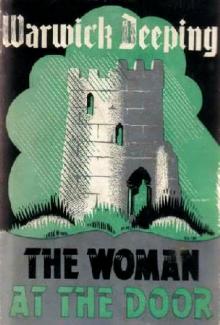 The Woman at The Door
The Woman at The Door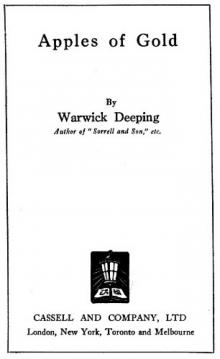 Apples of Gold
Apples of Gold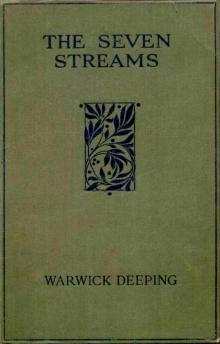 The Seven Streams
The Seven Streams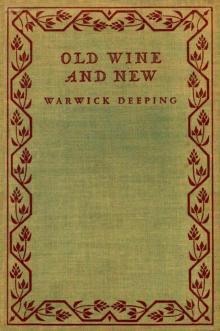 Old Wine and New
Old Wine and New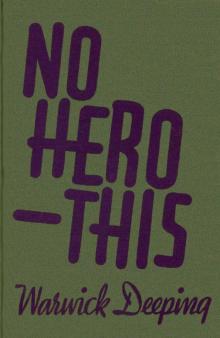 No Hero-This
No Hero-This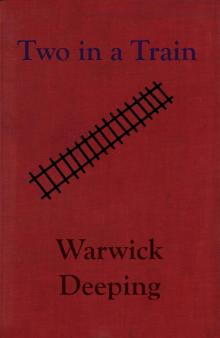 Two in a Train
Two in a Train Valour
Valour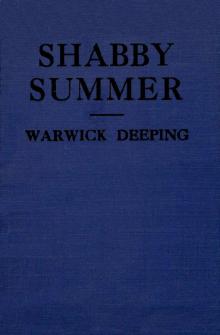 Shabby Summer
Shabby Summer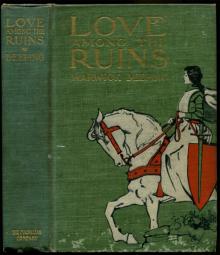 Love Among the Ruins
Love Among the Ruins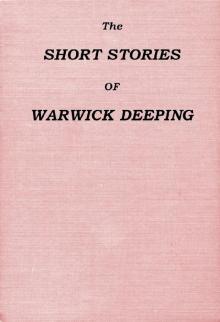 The Short Stories of Warwick Deeping
The Short Stories of Warwick Deeping